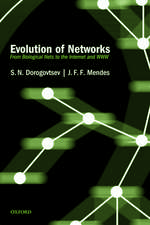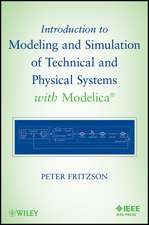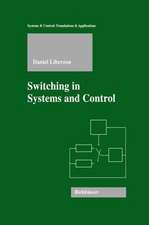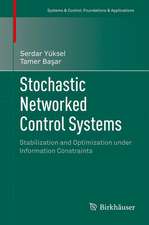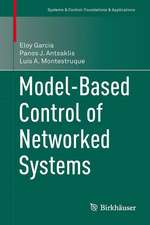Design Methodology for Intelligent Technical Systems: Develop Intelligent Technical Systems of the Future: Lecture Notes in Mechanical Engineering
Editat de Jürgen Gausemeier, Franz Josef Rammig, Wilhelm Schäferen Limba Engleză Hardback – 10 feb 2014
The Collaborative Research Center 614 "Self-optimizing Concepts and Structures in Mechanical Engineering" pursued the long-term aim to open up the active paradigm of self-optimization for mechanical engineering and to enable others to develop self-optimizing systems.
This book is directed to researchers and practitioners alike. It provides a design methodology for the development of self-optimizing systems consisting of a reference process, methods, and tools. The reference process is divided into two phases the domain-spanning conceptual design and the domain-specific design and development. For the conceptual design a holistic approach is provided. Domain-specific methods and tools developed especially for the design and development of self-optimizing systems are described and illustrated by application examples. This book will enable the reader to identify the potential for self-optimization and to develop self-optimizing systems independently.
| Toate formatele și edițiile | Preț | Express |
|---|---|---|
| Paperback (1) | 567.32 lei 38-44 zile | |
| Springer Berlin, Heidelberg – 27 aug 2016 | 567.32 lei 38-44 zile | |
| Hardback (1) | 650.69 lei 6-8 săpt. | |
| Springer Berlin, Heidelberg – 10 feb 2014 | 650.69 lei 6-8 săpt. |
Din seria Lecture Notes in Mechanical Engineering
- 18%
 Preț: 1104.43 lei
Preț: 1104.43 lei - 18%
 Preț: 1238.56 lei
Preț: 1238.56 lei - 18%
 Preț: 1270.11 lei
Preț: 1270.11 lei - 18%
 Preț: 2521.03 lei
Preț: 2521.03 lei - 18%
 Preț: 1240.16 lei
Preț: 1240.16 lei - 18%
 Preț: 1281.98 lei
Preț: 1281.98 lei - 18%
 Preț: 1384.56 lei
Preț: 1384.56 lei - 18%
 Preț: 1219.63 lei
Preț: 1219.63 lei - 18%
 Preț: 1274.88 lei
Preț: 1274.88 lei - 18%
 Preț: 2105.12 lei
Preț: 2105.12 lei - 18%
 Preț: 970.24 lei
Preț: 970.24 lei - 18%
 Preț: 1446.91 lei
Preț: 1446.91 lei - 18%
 Preț: 1113.09 lei
Preț: 1113.09 lei - 18%
 Preț: 978.12 lei
Preț: 978.12 lei - 18%
 Preț: 965.52 lei
Preț: 965.52 lei - 18%
 Preț: 948.16 lei
Preț: 948.16 lei - 18%
 Preț: 1388.99 lei
Preț: 1388.99 lei - 18%
 Preț: 1246.47 lei
Preț: 1246.47 lei - 18%
 Preț: 2144.58 lei
Preț: 2144.58 lei - 18%
 Preț: 1235.43 lei
Preț: 1235.43 lei - 18%
 Preț: 1257.51 lei
Preț: 1257.51 lei - 18%
 Preț: 1248.02 lei
Preț: 1248.02 lei - 18%
 Preț: 1866.00 lei
Preț: 1866.00 lei - 18%
 Preț: 1271.72 lei
Preț: 1271.72 lei - 18%
 Preț: 978.90 lei
Preț: 978.90 lei - 18%
 Preț: 952.09 lei
Preț: 952.09 lei - 18%
 Preț: 956.03 lei
Preț: 956.03 lei - 18%
 Preț: 1383.00 lei
Preț: 1383.00 lei - 18%
 Preț: 969.44 lei
Preț: 969.44 lei - 18%
 Preț: 967.08 lei
Preț: 967.08 lei - 18%
 Preț: 952.89 lei
Preț: 952.89 lei - 18%
 Preț: 1448.48 lei
Preț: 1448.48 lei - 18%
 Preț: 971.01 lei
Preț: 971.01 lei - 18%
 Preț: 1565.92 lei
Preț: 1565.92 lei - 18%
 Preț: 1394.84 lei
Preț: 1394.84 lei - 18%
 Preț: 945.92 lei
Preț: 945.92 lei - 18%
 Preț: 1394.03 lei
Preț: 1394.03 lei - 18%
 Preț: 1721.56 lei
Preț: 1721.56 lei - 18%
 Preț: 1218.06 lei
Preț: 1218.06 lei - 18%
 Preț: 2191.93 lei
Preț: 2191.93 lei - 18%
 Preț: 1110.72 lei
Preț: 1110.72 lei - 18%
 Preț: 1710.53 lei
Preț: 1710.53 lei - 18%
 Preț: 1271.72 lei
Preț: 1271.72 lei - 18%
 Preț: 958.38 lei
Preț: 958.38 lei - 18%
 Preț: 1397.19 lei
Preț: 1397.19 lei -
 Preț: 356.80 lei
Preț: 356.80 lei - 18%
 Preț: 1923.58 lei
Preț: 1923.58 lei - 18%
 Preț: 1908.57 lei
Preț: 1908.57 lei - 18%
 Preț: 1899.11 lei
Preț: 1899.11 lei
Preț: 650.69 lei
Preț vechi: 765.51 lei
-15% Nou
Puncte Express: 976
Preț estimativ în valută:
124.50€ • 130.01$ • 102.81£
124.50€ • 130.01$ • 102.81£
Carte tipărită la comandă
Livrare economică 15-29 aprilie
Preluare comenzi: 021 569.72.76
Specificații
ISBN-13: 9783642454349
ISBN-10: 3642454348
Pagini: 376
Ilustrații: XVIII, 358 p. 192 illus.
Dimensiuni: 155 x 235 x 26 mm
Greutate: 0.7 kg
Ediția:2014
Editura: Springer Berlin, Heidelberg
Colecția Springer
Seria Lecture Notes in Mechanical Engineering
Locul publicării:Berlin, Heidelberg, Germany
ISBN-10: 3642454348
Pagini: 376
Ilustrații: XVIII, 358 p. 192 illus.
Dimensiuni: 155 x 235 x 26 mm
Greutate: 0.7 kg
Ediția:2014
Editura: Springer Berlin, Heidelberg
Colecția Springer
Seria Lecture Notes in Mechanical Engineering
Locul publicării:Berlin, Heidelberg, Germany
Public țintă
ResearchCuprins
The Paradigm of Self-Optimization.- Examples of Self-Optimizing Systems.- Development of Self-Optimizing Systems.- Methods for the Domain-Spanning Conceptual Design.- Methods for the Design and Development.- Summary and Outlook.
Textul de pe ultima copertă
Intelligent technical systems, which combine mechanical, electrical and software engineering with control engineering and advanced mathematics, go far beyond the state of the art in mechatronics and open up fascinating perspectives. Among these systems are so-called self-optimizing systems, which are able to adapt their behavior autonomously and flexibly to changing operating conditions. Self-optimizing systems create high value for example in terms of energy and resource efficiency as well as reliability.
The Collaborative Research Center 614 "Self-optimizing Concepts and Structures in Mechanical Engineering" pursued the long-term aim to open up the active paradigm of self-optimization for mechanical engineering and to enable others to develop self-optimizing systems.
This book is directed to researchers and practitioners alike. It provides a design methodology for the development of self-optimizing systems consisting of a reference process, methods, and tools. The reference process is divided into two phases the domain-spanning conceptual design and the domain-specific design and development. For the conceptual design a holistic approach is provided. Domain-specific methods and tools developed especially for the design and development of self-optimizing systems are described and illustrated by application examples. This book will enable the reader to identify the potential for self-optimization and to develop self-optimizing systems independently.
The Collaborative Research Center 614 "Self-optimizing Concepts and Structures in Mechanical Engineering" pursued the long-term aim to open up the active paradigm of self-optimization for mechanical engineering and to enable others to develop self-optimizing systems.
This book is directed to researchers and practitioners alike. It provides a design methodology for the development of self-optimizing systems consisting of a reference process, methods, and tools. The reference process is divided into two phases the domain-spanning conceptual design and the domain-specific design and development. For the conceptual design a holistic approach is provided. Domain-specific methods and tools developed especially for the design and development of self-optimizing systems are described and illustrated by application examples. This book will enable the reader to identify the potential for self-optimization and to develop self-optimizing systems independently.
Caracteristici
Presents the methods needed to implement self-optimization in mechatronic systems easily to develop the technical systems of the future Provides a holistic approach for the development of self-optimizing systems Outcome of the Collaborative Research Centre (CRC) 614 “Self-optimizing concepts and structures in mechanical engineering”, funded from June 2002 until June 2013 by the German Research Foundation (DFG)



